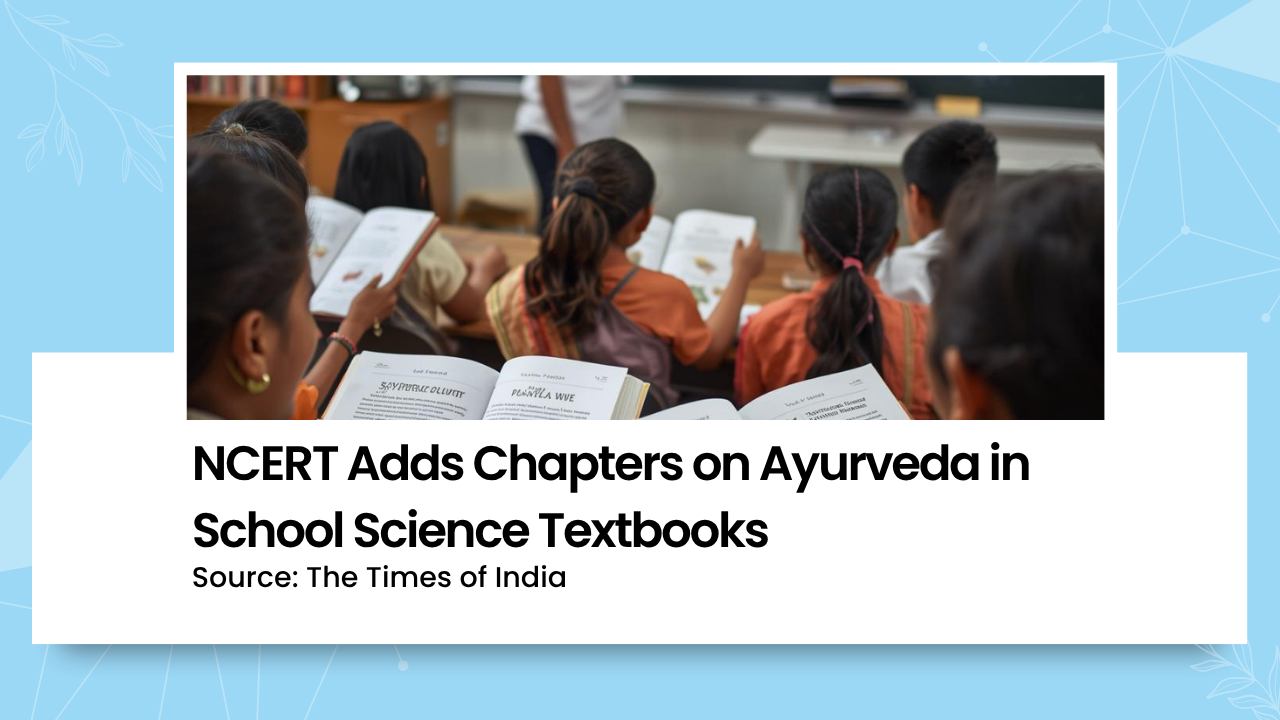NCERT Adds Ayurveda to School Science Textbooks: A New Chapter in Holistic Learning
28-Oct-25 19:48:53

Introduction: Modern Classrooms Meet Ancient Wisdom
In a historic education reform, the National Council of Educational Research and Training (NCERT) has integrated Ayurveda, Angula measurements, and Sanskrit shlokas into its new Curiosity science textbooks for Classes VI to VIII.
This move marks a significant alignment with India’s National Education Policy (NEP) 2020, which advocates for a multidisciplinary and culturally rooted curriculum.
Starting in 2025, school students across India will learn Ayurveda’s scientific principles through age-appropriate lessons in health, nutrition, and environmental balance.
Ayurveda in the New Science Curriculum
According to Dinesh Prasad Saklani, Director of NCERT, the goal is to connect modern scientific understanding with traditional systems of knowledge.
“Ayurveda and Indian sciences will help students understand the world through India’s lens. This integration creates a smooth transition between school education and higher learning,” Saklani stated in The Print.
The new Class VI textbook introduces fundamental Ayurvedic principles such as the 20 Gunas (qualities), including hot–cold, light–heavy, and mobile–static.
Class VIII’s Ayurveda: Balance of Body, Mind, and Environment chapter explains Dinacharya (daily routine), Ritucharya (seasonal discipline), and mindful living.
Why It Matters
The integration is more than symbolic — it’s about nurturing scientific curiosity in indigenous systems.
Students will now understand health as a dynamic balance, not just a biological process.
It also helps dismantle the misconception that Ayurveda is unscientific.
By introducing these ideas early, NCERT aims to inspire future researchers, scientists, and healthcare professionals to explore Ayurveda through critical inquiry.
Ayuquo Centrum’s Contribution to Ayurveda Education
Ayuquo Centrum, Noida — under the leadership of (Vaidya) Dr. Piyush Juneja — has been a strong advocate for early Ayurvedic awareness among youth.
The center regularly organizes school outreach programs that introduce students to concepts such as balanced nutrition, herbal identification, stress management, and meditation.
“When students learn Ayurveda as science, not superstition, they develop respect for their heritage and a deeper sense of self-care,” says Dr. Juneja.
Through partnerships with educational institutions, Ayuquo Centrum and IndianVaidyas are helping bridge academic knowledge with practical experience — turning Ayurveda from a subject into a way of life.
Integration Beyond Science
Ayurvedic principles will also feature in Physical Education and Well-Being subjects from Classes III to X.
This includes yoga postures, breathing exercises, and daily wellness habits that promote mental and physical health.
Additionally, Ayurveda concepts are being incorporated into teacher training programs to ensure effective classroom delivery and continuity in learning.
IndianVaidyas’ Perspective: Ayurveda for a Healthier Nation
IndianVaidyas.com, India’s largest verified Ayurveda platform, applauds this move as a milestone for integrative education.
By introducing Ayurveda within mainstream science, India is taking a step toward evidence-based traditional learning — aligning cultural pride with global relevance.
This inclusion not only supports Ayush Ministry initiatives but also lays the foundation for research, innovation, and responsible wellness education.
Conclusion: The Future of Learning Is Balanced
With Ayurveda entering classrooms, India’s education system is embracing a fuller definition of science — one that unites tradition, evidence, and curiosity.
This reform ensures that future generations grow up valuing prevention, balance, and the interconnectedness of life.
“Ayurveda is not a relic of the past; it’s the foundation of the future. The NCERT decision is proof that India is finally aligning education with holistic well-being,” concludes (Vaidya) Dr Piyush Juneja.
Source: The Print — Ayurveda & Shlokas in New NCERT Textbooks (2025)
Discover More: https://ayuquo.com/ | www.indianvaidyas.com